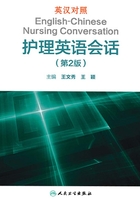
上QQ阅读APP看书,第一时间看更新
26.Transfusion输液
Nurse:(adjusting the rate of the IV drips)Good morning,Mr. Xu. Do you feel any discomfort because the drip rate is too fast?
护士:(边调节补液滴速边说)徐先生,滴速太快了,你有什么不舒服吗?
Patient: No,I am fne.
病人: 我现在感觉挺好的,没什么不舒服。
Nurse: Mr. Xu,you see,the rate of intravenous drips is 80 drops/min now. I think you just want to fnish the transfusion sooner. Am I right?
护士: 徐先生,你看,你现在的滴速是80滴/分,我想你是想快一点儿把补液滴完,是吗?
Patient: Yes,there is no problem with my heart function. So I increased the rate. I would like to fnish the transfusion sooner so I can take a walk and do some exercises.
病人: 是的,我的心脏没什么问题,所以我把补液调快了。况且快点滴完后,还可以散散步,多活动活动。
Nurse: I admire your energetic attitude. It’s true that proper exercises are very benefcial to older people. But the functions of organs will decrease with aging. Rapid transfusion will lead to the accumulation of fuid in the heart,increase the burden to the heart,and cause many uncomfortable symptoms,such as dyspnoea,rapid heart rate and even heart failure.
护士: 我很赞赏你这种活跃的心态。是的,适当的活动对老年人来说非常有益,但是,随着年龄的增长,身体内各脏器的功能也会随之减弱。快速的输液会使大量液体在短时间内积聚在心脏,加重心脏负担,从而引起许多的不适症状,如胸闷,心跳加快,甚至会引起心功能衰竭。
Patient: I think what you said is very reasonable. But I didn’t feel any discomfort at all.
病人: 你的话,我觉得很有道理。但是,我没有感到不舒服呀。
Nurse: Maybe you can’t feel that. But it doesn’t mean the burden on the heart is not increased.Just think what will happen to a machine when it overworks? The original purpose of the transfusion is to give your brain cells more nutrition. Do you think it is worthwhile to risk potential heart failure to fnish the transfusion a little faster?
护士: 可能你自己感觉不到,但这并不意味着你的心脏没有加重负担。试想一下,如果有一部机器一直让它超负荷运转,机器会怎样?本来输液是为了治疗疾病营养脑细胞,但是如果因为输液过快引起心衰,那该多不划算呀?
Patient:(smiling)All right,young lady,I will follow your instructions and not increase the drip rate anymore.
病人:(笑了)好吧,小家伙,就听你的话,我不再调快滴速了。
Nurse: Great. Thank you for your cooperation. I will begin your transfusion as soon as possible so you can have more time to do other activities.
护士: 太好了,谢谢你的合作。我会尽量早一点为你输液,以便你有更多的活动时间,好吗?
Patient: Good! Thank you.
病人: 好的,谢谢!